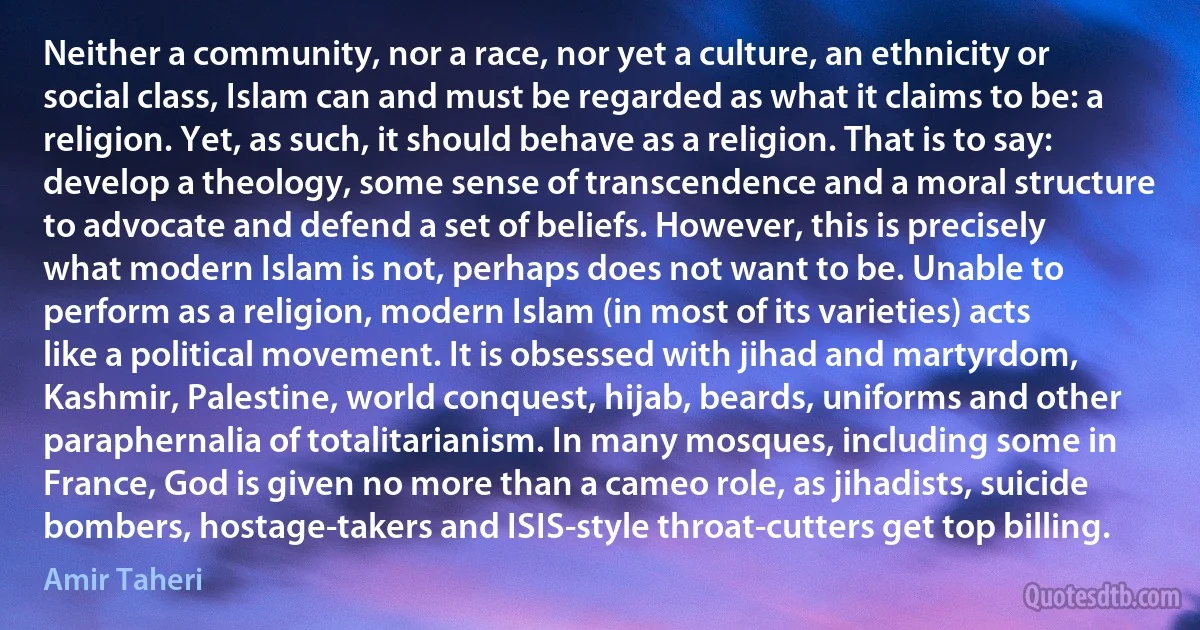
Neither a community, nor a race, nor yet a culture, an ethnicity or social class, Islam can and must be regarded as what it claims to be: a religion. Yet, as such, it should behave as a religion. That is to say: develop a theology, some sense of transcendence and a moral structure to advocate and defend a set of beliefs. However, this is precisely what modern Islam is not, perhaps does not want to be. Unable to perform as a religion, modern Islam (in most of its varieties) acts like a political movement. It is obsessed with jihad and martyrdom, Kashmir, Palestine, world conquest, hijab, beards, uniforms and other paraphernalia of totalitarianism. In many mosques, including some in France, God is given no more than a cameo role, as jihadists, suicide bombers, hostage-takers and ISIS-style throat-cutters get top billing.
Amir TaheriRelated topics
billing cameo conquest given islam martyrdom nor paraphernalia perhaps race religion say sense set should theology top transcendence world yet totalitarianism Acts jihad Palestine ethnicity hijabRelated quotes
In a capitalist democracy there are essentially two methods by which social choices can be made: voting, typically used to make ‘political' decisions, and the market mechanism, typically used to make ‘economic' decisions. In the emerging democracies with mixed economic systems Great Britain, France, and Scandinavia, the same two modes of making social choices prevail, though more scope is given to the method of voting and to decisions based directly or indirectly on it and less to the rule of the price mechanism. Elsewhere in the world, and even in smaller social units within the democracies, the social decisions are sometimes made by single individuals or small groups and sometimes (more and more rarely in this modern world) by a widely encompassing set of traditional rules for making the social choice in any given situation, for example, a religious code.

Kenneth Arrow
If we refuse...what are the prospects? Repression, and nothing but repression, and it is a very uncomfortable repression; a kind of repression from which we shall get neither credit nor success. It is the repression of the masses of the people, the great proportion of these masses being women and children. It is the repression not of organisations and not of bodies; it will develop into the repression of the whole of the population. ... If, on the other hand, you wish to bind India to you by bonds of confidence, to make her happy within your Empire and Commonwealth, if you wish to hear her praise you in gratitude and remain with you in pride, then accept the work that has been done by the Conference, and instruct the Government to proceed with it to a complete conclusion.

Ramsay MacDonald
Decidedly, we are at cross-purposes. What's all this you tell [from England] about the modern movement, commercialism, etc, etc? It bears no relation to our concept of art, at any rate here... That is where the error lies. Trade serves those up to us as readily as anything else; so it is no use. Wouldn't it be better to steep ourselves in genuine nature again? I do not consider in the least that we are making a mistake, that we should turn to the steam-engine and follow the general public [ William Morris, the more traditional artist became very popular those days]... No, a thousand times no! We are here to point the way.... the remedy is to be found in nature, more than ever. Let us follow what we consider to be the proper aim, we shall see who is right. After all, money is a fragile thing; let us earn some of it, since we must, but let us keep to our role.

Camille Pissarro
The abhorrent acts in the prison were a direct consequence of the culture of impunity encouraged, authorized and instituted by Bush and Rumsfeld in their statements that the Geneva Conventions did not apply. The apparent war crimes that took place were the logical, inevitable outcome of policies and statements from the administration.
To me, as glaring as the evidence of this in the pictures themselves was the revelation that it was established practice for prisoners to be moved around during ICRC visits so that they would not be available for visits. That, no one can claim, was the act of individuals. That was policy set from above with the direct intention to violate US values it was to be upholding. It was the kind of policy we see - and criticize in places like China and Cuba.

Al Gore
For what advantage is it, that the world enjoys profound peace, if thou art at war with thyself? This then is the peace we should keep. If we have it, nothing from without will be able to harm us. And to this end the public peace contributes no little: whence it is said, ‘That we may lead a quiet and peaceable life.' But if any one is disturbed when there is quiet, he is a miserable creature. Seest thou that He speaks of this peace which I call the third (inner, ed.) kind? Therefore when he has said, ‘that we may lead a quiet and peaceable life,' he does not stop there, but adds ‘in all godliness and honesty.' But we cannot live in godliness and honesty, unless that peace be established. For when curious reasonings disturb our faith, what peace is there? or when spirits of uncleanness, what peace is there?

John Chrysostom
